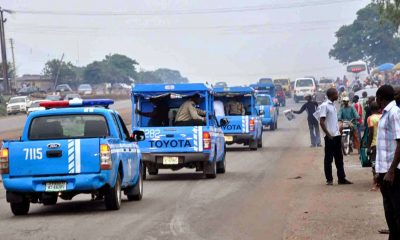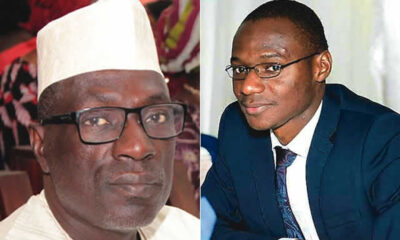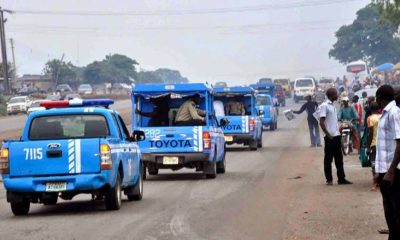metro
Worry as FRSC, WHO, W’Bank confirm rising road casualties in Nigeria

Nigerians have a reason to worry over the increasing rate of road crashes with heavy casualties in the country.
Figures from the Federal Road Safety Corps and international groups such as the World Health Organisation and the World Bank confirmed the alarming rise in accident rate in Nigeria.
This is coming despite efforts by government interventionist agencies including the FRSC set up to address the menace of road crashes.
The Nigeria Auto Journal published by the Nigeria Auto Journalists Association revealed this in its latest edition released this month (February, 2023).
In the story titled, ‘High Road Crashes, Burden of a Nation’, the journal quotes the World Bank as putting the number of people killed yearly via road accidents in Nigeria at 30,800.
The World Health Organisation has a slightly higher figure of 41,693, which is 2.82 per cent of the global total.
The report read in part, “Local statistics show a total of 32,617 people died in 65,053 on Nigerian roads from 2016 to 2021, as revealed by Mr. Ayobami Omiyale, a retired assistant corps marshal of the FRSC at a recent retreat by the commission in Lagos.
“Quoting from the FRSC official statistics, he said 5,053 lives were lost in 2016, while 5,121 and 5,181 lives were cut short in 2017 and 2018 respectively. In 2019 and 2020, about 5,483 and 5,574 lives were also lost respectively while 6,205 lives got perished in 2021.
“The National Bureau of Statistics, relying on the FRSC data, revealed that 1,834 people died in 3,345 road accidents in the country between January and March 2022.”
Although the figures from the international groups may be higher than those provided by the FRSC, the latter puts the daily average of road accidents in Nigeria at 36 with high casualties.
Chief Executive Officer, Safety Beyond Borders, Mr Patrick Adenusi, explained that many road accidents recorded in the night, especially in northern Nigeria, are hardly reported.
The FRSC Corps Marshal Dauda Biu attributed a recent Ojuelegba Bridge accident in Lagos to wrongful overtaking and excessive speeding by the truck driver. Nine people including two children died in the crash in which a truck carrying a container fell on a commercial bus.
The FRSC and NBS also listed factors responsible for the road crashes as light/sign violation, dangerous driving and tyre-burst, break failures, route violation and bad roads.
Segun Ogungbemide, Lagos Sector Commander of the FRSC, tries to exonerate the corps from the rising road crashes saying they only have the capacity to address only 16 per cent of the problem. “The one that will give more impact is to keep policies and regulations in place to prevent the crashes from happening,” he stated.
But the report notes that road marshals, vehicle inspection officers (VIOs) and highway police as well as state traffic law enforcers are no longer as effective as they used to be.
Many safety campaigns and strategies by the FRSC to curtail road crashes have either disappeared or played down. Some of them are the installation speed limiter in vehicles; use of seat belt; crash helmet; use of alcolyzer and radar gun to know drunk driver and over-speeding driver respectively.
Analysts also accused the officials of the agency of placing emphasis on gratification and revenue generation at the expense of safety.
Before things started going bad, many road safety enlightenment campaigns and enforcement had been embarked upon by the FRSC and relevant agencies across the country. Some of them are operation use of safety belt, installation of speed limiter in vehicles, use of crash helmet by every motorcycle rider and passenger, compulsory psychiatric test for driving against the traffic (one-way driving), arrest of driver using phone while driving and don’t drink while driving.
The report also mentioned the different strategies and facilities used during enforcement such as alcolyzer and radar gun but regrettably noted that they had all disappeared.
metro
Yuletide: Travellers want fare discount for road trips
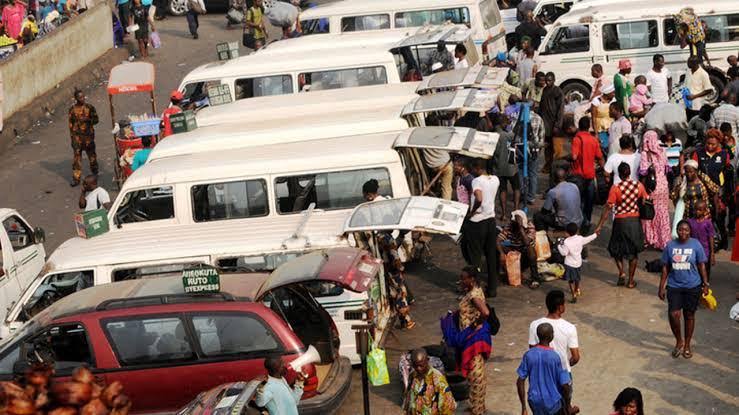
Yuletide: Travellers want fare discount for road trips
- Bemoan high fares
Passengers travelling to their country homes for the Christmas and new year day celebrations have urged the Federal Government to extend the free rail services announced early in the week to road transport routes across the country.
Some of the travellers who complained about the high fares called on the Federal Government to restore the 50 percent fare reduction on inter-state luxury bus routes granted to road passengers at this time last year.
The passengers who spoke at various terminals and loading stations of long distance road transport companies in Lagos, were reacting to the upsurge in fares to about N40,000 on luxury buses and N65,000 on mini buses going to the South-East.
Reports from some of the boarding stations revealed that upon hearing the announcement of free train ride, some passengers thronged the loading stations at various points in Lagos to benefit from the gesture, but were disappointed when they were informed that the offer did not cover road transport.
At Terminal 1 in Oshodi, Alafia, Jibowu, Mazamaza, and private stations in the Cele/Ejigbo axis, on Saturday, passengers bemoaned the high cost of travelling on both the big and small buses, disclosing that many people were not travelling because they couldn’t afford “the exorbitant fares the transport firms are collecting.”
Interestingly, a trip on board Toyota Sienna which used to attract slightly higher fare than on a typical mini bus, is the same at N40,500.
One of the passengers told our reporter one if the stations in Cele, “You press people should please tell (President Bola) Tinubu that poor masses cannot afford to go home this Christmas because there is no money in the country.
“(President) Tinubu should please repeat the 50 percent discount on long distance fares which some of us enjoyed last year to travel home.”
At the nearby Young Young Shall Grow station, a passenger who planned to travel to the east recalled how he took advantage of the 50 percent fare discount to travel from Abuja to Onitsha and back in 2023, and wondered why the Federal Government has not considered the re-introduction of the palliative this festive season.
According to the man who gave his name as Chinedu Uzoechina, his intention to travel to Anambra state and back with his wife and five children, has been stalled by the high transport fares being charged at the various terminals.
Uzoechina, who came to book for seats in advance, lamented, “I was hoping that the 50 percent fare discount that followed the increase in fuel pump price would be available this year, but that has not been the case this year. Forty thousand into seven is N280,000 for one-way luxury tickets.
“If you add the cost of coming back, it means I will spend nothing less than N560,000 on transportation alone for seven of us. Where will I get that kind of money? I have called my wife to inform her of the situation here (at the terminals in Cele).
“She is not happy that we are not travelling anymore, but what can I do?”
According to him, the only thing that can make his family travel again is if the Federal Government extends the free train ride offer to long distance road transport routes, like Lagos-east, or reduces the fares in collaboration with the operators.
Like Uzoechina, many other intending travellers were still hopeful that the government wiuld still intervene with a fare discount, even as they disclosed that they would either cancel the trips outrightly or reduce the number of tickets to be bought, if their hopes are dashed.It was learnt that the fares were slightly lower by about N2,000 at Terminal 1 where both big and mini buses have been loading for day and night trips at Oshodi.
Reacting to the passengers’ complaints about high fares at the terminal owned by the Lagos State Government, Damian Ezuma, the manager of Izu Chukwu Transport, blamed the situation on the rising cost of maintaining the buses as well as on the pump price of diesel, which he said, is as high as N2,000 a litre in some parts of the country.
“It is not our fault. The cost of maintenance is so high that it is only by the grace of God that some of transport companies still manage to keep their buses on the road these days. Do you know that one big bus tyre costs between N250,000 and N500,000, depending on the quality and brand?” Ezuma argued.
He confirmed that many intending travellers who heard about the free train services offer by the Federal Government have been coming to the terminal make enquiries on whether long distance-plying buses are part of the gesture and whether last season’s fare discount applies this year.
Many of them leave the terminal disappointed and deciding not to travel anymore, but opting instead to wait for a possible fare palliative from the government.
Also commenting on the reason for the high fares, a manager at Chisco Transport’s head office in Lagos explained that the unfavourable naira-dollar exchange rate has impacted on the prices of replacement parts and maintenance costs generally.
But a major factor is the fact that during the peak festive season, buses are usually full when leaving major cities like Lagos and Abuja, but are almost empty in their return journeys.
So some operators slightly adjust their fares upward to cover the losses incurred during return trips.
In 2023, the special fare discount by government through the luxury bus owners took effect on December 21, and lasted till the second week of January, 2024.
metro
Navy arrests 19 Nigerians attempting to reach Europe by hiding on ship

Navy arrests 19 Nigerians attempting to reach Europe by hiding on ship
The Nigerian Navy Ship (NNS) BEECROFT has successfully apprehended 19 individuals attempting to stow away on Europe-bound vessels.
In a statement issued on Saturday in Lagos, the ship’s Information Officer, Lt. Hussaini Ibrahim, disclosed that 15 stowaways were intercepted on Dec. 19 aboard the European-bound Moto Tanker (MT) KRITI RUBY. Another four were caught on Dec. 21 aboard MT MCC YANBU.
“Preliminary investigation revealed that the stowaways boarded the vessels at night and concealed themselves in the rudder compartment while attempting to illegally migrate to Europe,” Ibrahim stated.
The Navy’s Quick Response Team (QRT), operating from ATLAS COVE and using the Falcon Eye Alignment under the Nigerian Navy Maritime Domain Awareness Facility, facilitated the interception of the 15 individuals near the Lagos fairway buoy.
READ ALSO:
- Troops arrest four Ambazonian rebels in Taraba
- NIMC warns against extortion, reaffirms free NIN enrollment
- NNPC denies claim of Port Harcourt refinery shutdown
Ibrahim further explained that credible intelligence led to the interception of the additional four stowaways by Navy personnel deployed on escort duties aboard the vessel.
“The prompt response of the QRT saved the stowaways from exposure to life-threatening situations during the long voyage,” he added.
The first group of 15 individuals has been handed over to the Nigeria Immigration Service, Lagos State Port/Marine Command, Apapa, for further investigation and necessary action. The remaining four suspects will also be transferred in due course.
“The presence of stowaways poses serious security threats to maritime operations, including risks of smuggling, piracy, drug and human trafficking, among other maritime crimes,” Ibrahim noted.
He emphasized that under the leadership of Chief of Naval Staff Vice Adm. Emmanuel Ogalla, NNS BEECROFT will continue maintaining security along Lagos waterways and surrounding creeks to support safe maritime activities and economic growth.
Navy arrests 19 Nigerians attempting to reach Europe by hiding on ship
metro
Troops arrest four Ambazonian rebels in Taraba

Troops arrest four Ambazonian rebels in Taraba
Troops of the 6 Brigade Nigerian Army/Sector 3 of the Operation Whirl Stroke (OPWS), have arrested four suspected members of Ambazonian rebels in Taraba.
The News Agency of Nigeria (NAN) reports that Ambazonia is a rebel group operating in neighbouring Cameroon Republic.
A statement on Saturday in Jalingo by Capt. Olubodunde Oni, Acting Assistant Director Army Public Relations, said the suspects were arrested at a hotel in Takum town.
The statement said that acting on credible intelligence, the suspects were tracked and apprehended.
According to the statement, during initial interrogation, the suspects confessed to being part of the rebel group involved in arms proliferation in exchange for cocoa with their Nigerian collaborators.
It said that four mobile handsets were recovered from the suspects now in detention undergoing further investigation.
READ ALSO:
- NIMC warns against extortion, reaffirms free NIN enrollment
- NNPC denies claim of Port Harcourt refinery shutdown
- Like Ibadan, stampede claim 10 lives for Abuja Catholic church, 17 in Anambra
The statement also said that in another operation following actionable intelligence, troops deployed at Natilde community in Bantaji District of Wukari Local Government Area intercepted a truck with registration number WKR 66 BB, transporting 19 pieces of stolen pipelines belonging to the Nigerian National Petroleum Corporation Limited (NNPCL).
It said that further collaborative efforts with the Nigeria Security and Civil Defence Corps (NSCDC) in Wukari Division led to the recovery of an additional 11 pipes, bringing the total to 30.
“The recovered items have been handed over to the NSCDC Wukari Division for further investigation and necessary action.
“The 6 Brigade Nigerian Army will remain resolute in its commitment to safeguarding lives and property while ensuring the security of critical national infrastructure.
“We urge members of the public to continue providing timely and credible information to security agencies to enhance our collective efforts in maintaining peace and security,” the statement added.
Troops arrest four Ambazonian rebels in Taraba
(NAN)
-

 metro2 days ago
metro2 days agoCourt stops customs from seizing imported rice in open market
-

 Railway13 hours ago
Railway13 hours agoLagos Rail Mass Transit part of FG free train ride – NRC
-

 metro3 days ago
metro3 days agoFG transfers electricity market regulatory oversight in Lagos to LASERC
-

 metro2 days ago
metro2 days agoAfe Babalola: Court grants Dele Farotimi bail, barred from media interviews
-

 metro2 days ago
metro2 days agoIbadan stampede: Tinubu orders probe as death toll hits 40
-

 News2 days ago
News2 days agoAdebayo Ogunlesi, 2 other Nigerians make Forbes 50 wealthiest Black Americans list 2024
-
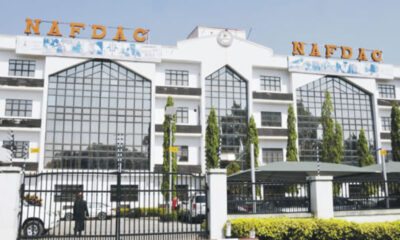
 metro2 days ago
metro2 days agoNAFDAC seizes N5bn fake rice, seals factory in Nasarawa
-
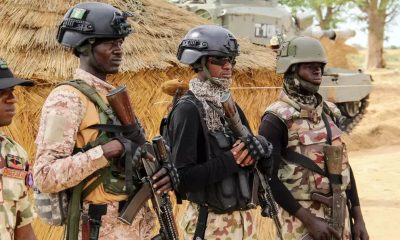
 metro3 days ago
metro3 days agoAbuja demolition: Soldiers attack FCTA officials, seize vehicles

